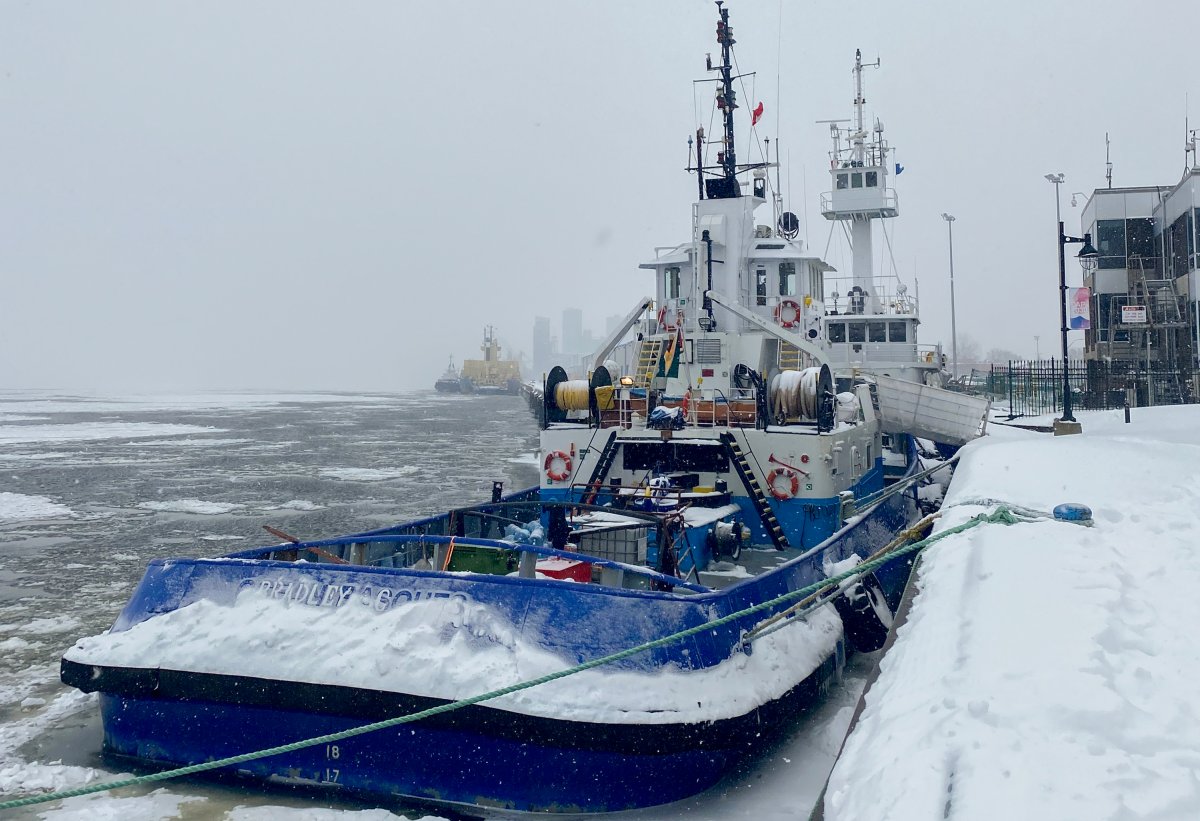Groups that advocate for seafarers are expressing concern for 11 sailors who are spending a harsh Quebec winter aboard three tugboats that have been detained for months in the port of Trois-Rivières.

Paul Racette, who operates the Foyer des Marins seafarers’ club in the port, said the workers, who hail from Mexico, Cuba and Guyana, aren’t used to winter.
“For them, 17 degrees is cold, so imagine them having to work outdoors at the temperatures we’re having now,” he said in an interview.
Furthermore, they’re weathering the winter on the moored tugboats, which he says aren’t designed for long-term living.

“It’s very small, it’s narrow, there are no conveniences inside, so it’s problematic,” he said.
The boats, which are in the 30 to 40 metre range, were sold last year to a company that wants to bring them to the South American nation of Guyana. But they’ve been detained in the port, halfway between Quebec City and Montreal, since October due to what Transport Canada describes as “non-compliance with various international maritime conventions,” including labour regulations that ensure the crew’s well-being.
“Before lifting the detention and authorizing the vessels to depart, Transport Canada will verify that the outstanding items have been rectified,” wrote spokeswoman Sau Sau Liu.
Racette said that while there were about 25 crew members originally, their numbers have dwindled to 11 as some have left and fewer have come to replace them.

Get daily National news
On a recent visit, two of the three tugboats could be seen moored along the river’s edge, dwarfed in size by the much larger ship behind them. Canadian and Guyanese flags whipped in the wind as heavy snow fell.
None of the sailors stepped out when a reporter stopped by, and Racette said none of the current crew wanted to speak with media out of concern they could face reprisals.
The vice president for the St. Lawrence and East Coast for the Seafarers International Union of Canada, who has been working with the crew, said he’s concerned about the sailors’ working and living conditions.

Vince Giannopoulos said some of these are matters of “base level legality,” including contracts. He said some of the seafarers were sent to the ships with only verbal agreements regarding pay, only to find upon arrival that the compensation in the written contract was far less than promised.
His visits to the ship, the most recent of which was in December, revealed “all sorts of problems,” ranging from a lack of safety and cold-weather equipment to inadequate food, he said.
“During a couple of my visits the crew was having Mr. Noodles three times a day,” he said. “That was their breakfast, lunch and supper.
“It’s hard to even find out where to begin with this story because there are just so many issues.”
Mark Wong, a seafarer from Guyana, spent six months aboard the vessels working as an engineer before flying home in late December.
While he found the living conditions aboard the tugboats to be generally good, the 59-year-old said it’s the first time he’s been stuck on a detained vessel for so long.
He said the situation began to drag on as crew members had to be switched out and inspections kept revealing more issues to be fixed.
He said the arrival of winter was “terrible,” and his strongest memory is the ice on the deck.
“I’m not accustomed to it,” he said.
Wong said he was one of those who arrived without a contract, and, while he’s received his wages, he says the company still owes him leave pay. Despite the issues, he said he would be willing to go back.
“Not in the winter though,” he added.
Racette said the seafarer’s club, which has a small budget and is mostly volunteer-run, has been doing what it can to support the crew. Members visit the vessels to bring treats, chat, and encourage the seafarers to visit their clubhouse, which has a pool table, snacks, comfortable chairs and Internet access.
Volunteers have come forward to help drive some of the crew to shopping centres or to attend a Spanish-language religious service, while community members have donated warm clothing, he said.
More recently, he’s been making an appeal for donations to take the crew on outings such as restaurant visits or bowling trips.
While it’s not clear how long it will take for the tugboats to get authorization to leave, Racette’s opinion is that they’ll remain in the port until at least April when the ice clears.







Comments